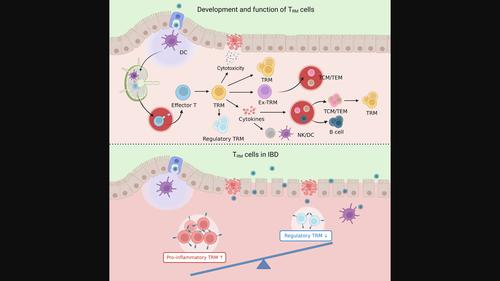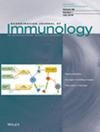肠组织驻留记忆T细胞在炎症性肠病中的研究进展
IF 4.1
4区 医学
Q2 IMMUNOLOGY
引用次数: 0
摘要
组织常驻记忆T细胞(trm)是最近发现的记忆T细胞亚群,它们驻留在非淋巴组织中,如肠和皮肤,不进入血液。肠道每天都会遇到许多病原体。肠道黏膜免疫需要在对病原体的免疫反应和对食物抗原和共生微生物群的耐受之间取得平衡。因此,肠道T - RM细胞表现出独特的特性。在健康的肠道中,T - RM细胞诱导必要的炎症来加强肠道屏障并抑制细菌易位。在肠道感染期间,T - RM细胞通过增殖、释放细胞因子和招募其他免疫细胞迅速消灭病原体。此外,某些T - RM细胞亚群可能具有调节功能。T - RM细胞参与炎症性肠病(IBD)越来越被认为是一个关键因素。在IBD中,促炎T - RM细胞的数量增加,而调节亚群的数量减少。此外,经典标记CD69和CD103对于肠道T - RM细胞并不理想。在这里,我们回顾了肠道T - RM细胞的表型、发育、维持和功能,以及在IBD背景下的最新发现。进一步了解肠道T - RM细胞的功能并区分它们的亚群对于开发针对这些细胞的治疗策略至关重要。本文章由计算机程序翻译,如有差异,请以英文原文为准。

Research progress on intestinal tissue‐resident memory T cells in inflammatory bowel disease
Abstract Tissue‐resident memory T (T RM ) cells are a recently discovered subpopulation of memory T cells that reside in non‐lymphoid tissues such as the intestine and skin and do not enter the bloodstream. The intestine encounters numerous pathogens daily. Intestinal mucosal immunity requires a balance between immune responses to pathogens and tolerance to food antigens and symbiotic microbiota. Therefore, intestinal T RM cells exhibit unique characteristics. In healthy intestines, T RM cells induce necessary inflammation to strengthen the intestinal barrier and inhibit bacterial translocation. During intestinal infections, T RM cells rapidly eliminate pathogens by proliferating, releasing cytokines, and recruiting other immune cells. Moreover, certain T RM cell subsets may have regulatory functions. The involvement of T RM cells in inflammatory bowel disease (IBD) is increasingly recognized as a critical factor. In IBD, the number of pro‐inflammatory T RM cells increases, whereas the number of regulatory subgroups decreases. Additionally, the classic markers, CD69 and CD103, are not ideal for intestinal T RM cells. Here, we review the phenotype, development, maintenance, and function of intestinal T RM cells, as well as the latest findings in the context of IBD. Further understanding of the function of intestinal T RM cells and distinguishing their subgroups is crucial for developing therapeutic strategies to target these cells.
求助全文
通过发布文献求助,成功后即可免费获取论文全文。
去求助
来源期刊
CiteScore
7.70
自引率
5.40%
发文量
109
审稿时长
1 months
期刊介绍:
This peer-reviewed international journal publishes original articles and reviews on all aspects of basic, translational and clinical immunology. The journal aims to provide high quality service to authors, and high quality articles for readers.
The journal accepts for publication material from investigators all over the world, which makes a significant contribution to basic, translational and clinical immunology.

 求助内容:
求助内容: 应助结果提醒方式:
应助结果提醒方式:


